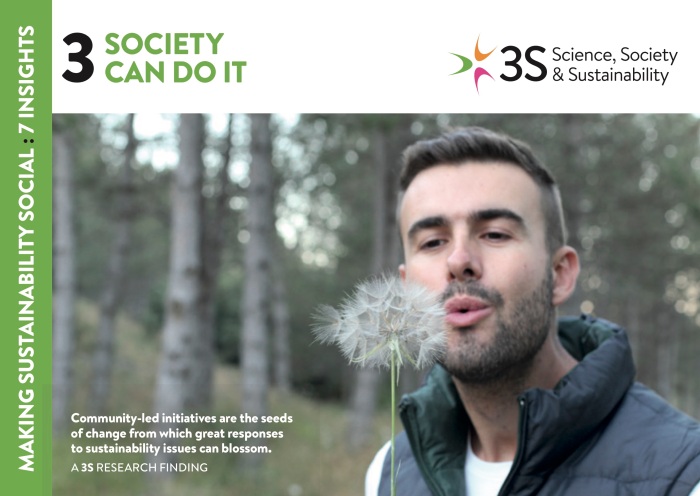Society is too often seen as a barrier to sustainability. But society can (and does) make a positive contribution to increasing sustainability
We need to recognise and unleash society’s potential as a source of wisdom, innovation and solutions to sustainability challenges. Too often civil society is portrayed as a barrier to sustainable development and a threat to innovation and ‘progress’. When controversial new technologies such as GM crops, fracking or geoengineering of climate change are resisted, the public are often labelled as anti-science or ignorant.
People’s unwillingness to change their behaviours and adopt more sustainable lifestyles get presented as one of the main reasons why numerous environmental issues remain unresolved – ignoring more systemic factors. The public’s assumed lack of understanding and interest in the environment gets blamed as well. Policy makers and scientists are bemused that sound scientific evidence isn’t enough to change people’s minds and behaviours.
But all of this doesn’t acknowledge the multiple ways in which people relate to and make sense of science and the environment. There may be many reasons why someone decides to keep living in a coastal erosion threatened area, get a smart-meter or give up flying.
People are already with the program
People’s actions and commitments often go unseen too. But 3S sees civil society as a source of wisdom, creativity and innovation.
Multiple forms of knowledge are needed to address sustainability issues. For example, 3S research demonstrates the value of considering fishermen’s local knowledge about the sea or coastal residents’ knowledge about erosion and weather events to inform climate change adaptation.
For good reason, governments have increased public involvement in science and policy through participatory practices. Furthermore, diverse social groups are already involved in transitions towards more sustainable forms of living through community action, individual behaviour and lifestyle change, protests, public engagement projects and much more.
Grassroots innovations – bottom-up solutions for sustainable development – are largely overlooked by governments. They include for example: alternative food networks providing local and/or organic products; community energy projects with low carbon emissions; alternative currencies; cycle networks; furniture recycling schemes and Transition Towns. Largely community-led, these grassroots innovations are providing answers to sustainability issues and asking new questions too.
Public concerns and values are often misunderstood
We must better understand how people are engaging with sustainability issues and their reasons for adopting, or rejecting, particular technologies and innovations. They’re not a passive monolithic entity awaiting education and enlightenment.
Civil society is made up of multiple, active and creative citizens and organizations including NGOs, social movements, artists, bloggers, cooperatives and musicians. They bring forward visions and concerns reaching beyond the formal delineated spaces of existing institutions. They often define sustainability challenges in entirely new ways.
Yet policy-makers and experts continually misunderstand public values and concerns – whether the issue is fracking, radioactive waste management, or smart technologies. They fail to address underlying public concerns over the purposes of innovation, the direction of change, issues of control, and questions of equity in terms of inclusion and the distribution of risks and benefits.
